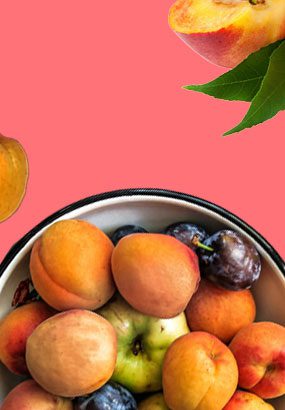Diet for Diabetes Type 1 Vegan Raw
If you have watched the Forks Over Knives movie or are a frequent visitor of this site, you already know that type 2 diabetes can be completely reversed by eliminating the foods that cause insulin resistance. Just knowing this has motivated thousands of people with type 2 diabetes to adopt the whole-food, plant-based (WFPB) diet and lifestyle.
But what if you're living with insulin-dependent (type 1 or 1.5) diabetes? Since there's no known cure for autoimmune diabetes, and eating a low-fat WFPB diet can't replace insulin injections and frequent blood glucose monitoring, what's the point of changing your diet at all?
Master plant-based cooking with forks
COURSE BEGINS JANUARY 4
Both of us live with type 1 diabetes and have been eating a low-fat, WFPB diet for more than a decade, and we'd like to reassure you that eating this way holds plenty of benefits for you, too. We, along with hundreds of our clients with type 1 diabetes, are living proof that people with type 1 diabetes experience extraordinary results from following a low-fat, WFPB lifestyle. Here are just a few of them:
1. A significant boost in insulin sensitivity: In our coaching practice, we teach people living with all forms of diabetes how to reverse insulin resistance using a WFPB diet, using a very similar approach as Drs. Ward and Anderson from the late 1970s. Our insulin-dependent clients reduce their insulin use by an average of 35 percent in only four days, which then increases to an average of 45 percent reduced insulin use over six months.
It's true, insulin resistance does not cause type 1 diabetes, but it is present in an overwhelming majority of people living with diabetes, especially those who eat a low-carbohydrate, high-fat, high-protein diet. That's important because insulin resistance is a major risk factor for chronic diseases like heart disease and cancer. In fact, heart disease is the No. 1 cause of death in people living with all forms of diabetes.
Our Western medical system focuses on managing biomarkers—like high blood glucose and high A1c levels—rather than treating their underlying cause: insulin resistance. Following a low-carb diet or taking medication can bring down these numbers, but it won't reverse insulin resistance or make you healthier.
HOW TO CALCULATE YOUR 24-HOUR INSULIN SENSITIVITY
If you use insulin, here's a simple way to measure 24-hour insulin sensitivity at home: First calculate your total carbohydrate intake over a 24-hour period using an online tool like CRON-O-Meter. Divide that number by your total insulin use (including both basal and bolus insulin). If the resulting ratio is less than 10:1, you are likely living with insulin resistance.
Reversing insulin resistance and increasing your insulin sensitivity is one of the most powerful ways to reduce your risk for all chronic disease. Increasing your 24-hour carbohydrate-to-insulin ratio is a simple way to track how your insulin sensitivity changes over time. For example, clients in our program start with an average 24-hour insulin sensitivity ratio of 2.7:1, and increase to 15.9:1 in three months, and 22.2:1 within six months.
2. Blood glucose levels become more predictable: When people with insulin-dependent diabetes follow a low-fat, WFPB lifestyle, their blood glucose variability goes down. But wait, you might ask: Doesn't a low-carbohydrate, high-fat diet work just as well? It's true that you can flatline your blood glucose and achieve an A1c level less than 5.3 percent by following a truly low-carbohydrate diet ( < 30 grams of total carbohydrates per day). But this approach can also lead to conditions including increased insulin resistance , hypertension , high cholesterol , coronary artery disease , and cancer .
3. Reduced risk of diabetic neuropathy: Because a low-fat, WFPB diet increases blood flow to tissues throughout the body (due to its lack of artery-clogging cholesterol and saturated fat), it can help prevent and reverse not only heart disease but also diabetic neuropathy, the nerve damage that can lead to pain, numbness, and even amputation and death.
4. Protection against kidney disease: If your blood glucose levels are perfect but you're eating a lot of animal-based protein, you may still have kidney problems. A low-fat, WFPB diet that excludes animal products reduces the burden on your kidneys because of its relatively low (but nutritionally sufficient) protein content. If untreated, chronic kidney disease can lead to dialysis and/or kidney transplant.
5. The ability to eat a lot and still lose weight: When you learn the simple principles of calorie density and start eating the foods highest in water, fiber, and nutrients, you will see for yourself how eating more can help you weigh less. If you have weight to lose, it will drop off quickly … and permanently! Never again will you need to stop eating before you're full to keep your body weight at an optimal level. And if you don't have weight to lose, you will maintain healthy body weight effortlessly, without giving a thought to portion control.
6. Guilt-free indulgence in some of the world's most delicious "comfort" foods: Luscious, juicy fruits (like mangoes, papayas, and bananas) and starchy whole plant foods (like potatoes, beans, and brown rice) are encouraged in large quantities on a low-fat, WFPB diet. When you're not eating the (high-fat) foods that paralyze insulin, the carbohydrate energy found in whole, unprocessed plant foods prevents elevations in blood glucose.
7. You get a ton of energy—and many other benefits: You will feel amazing on this diet! As your energy increases, you will find yourself far less lethargic and more capable of movement. And more exercise means better blood-glucose management and greater health and vitality overall. People who eat this way can look forward to a seemingly endless list of benefits that affect every aspect of life. Our clients report better sleep, better digestion, better mood … even increased happiness.
Don't forget to poke around in the Forks Over Knives articles to see both peer-reviewed research and testimonials from countless people living with diabetes and others who have experienced these benefits (and many more) after changing their diets!
Ready to get started? Check out Forks Meal Planner, FOK's easy weekly meal-planning tool to keep you on a healthy plant-based path. To learn more about a whole-food, plant-based diet, visit our Plant-Based Primer.

Related News
Learn how to cookplant-based meals at home

Forks Over Knives' online cooking course will help you learn new techniques, flavors, and skills to live your very best life.
Join the course
Discover finger-lickin'good food with our app

Get inspired! Our chefs add delicious new plant-based recipes every week to keep mealtime exciting and satisfying.
Get the recipe app
Diet for Diabetes Type 1 Vegan Raw
Source: https://www.forksoverknives.com/wellness/plant-based-diet-benefits-for-type-1-diabetes/

0 Response to "Diet for Diabetes Type 1 Vegan Raw"
Post a Comment